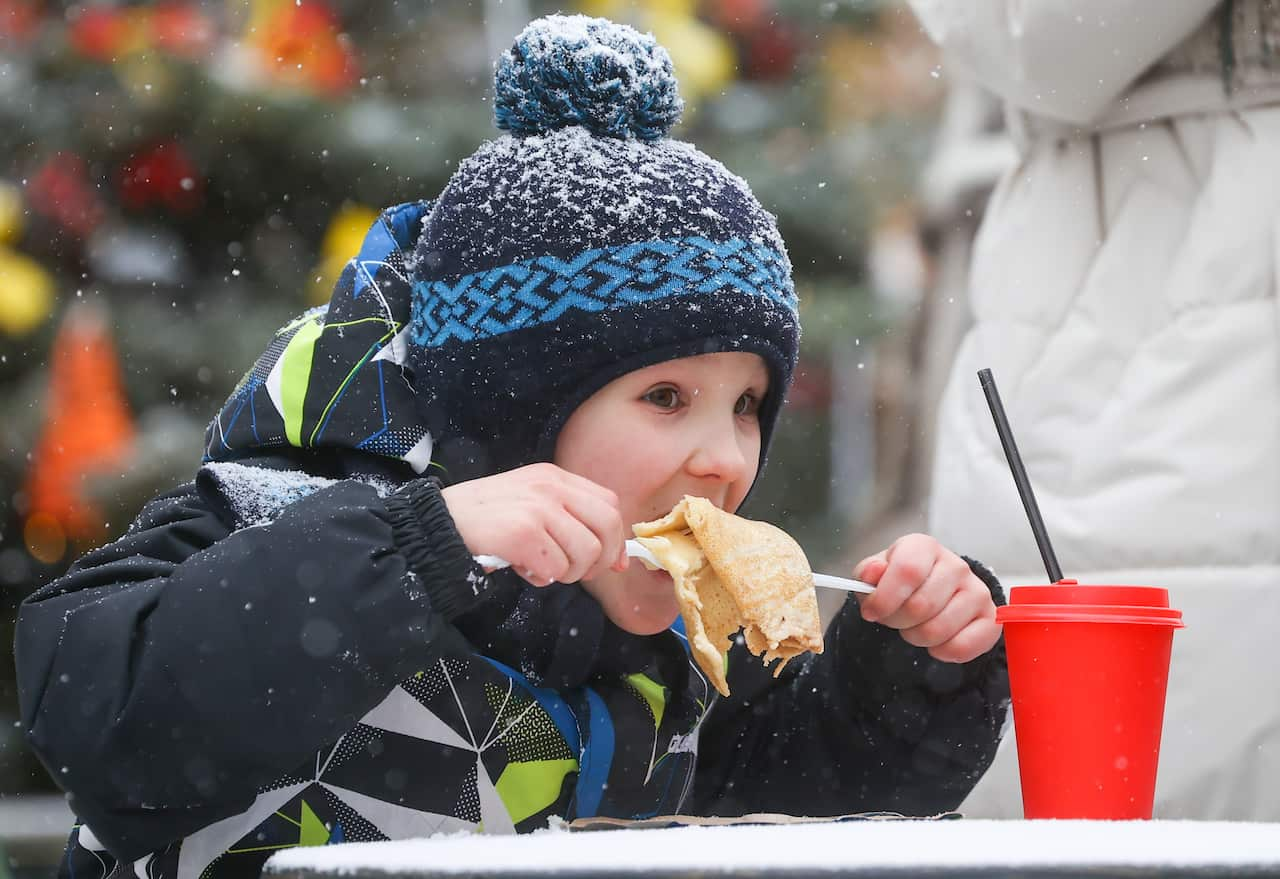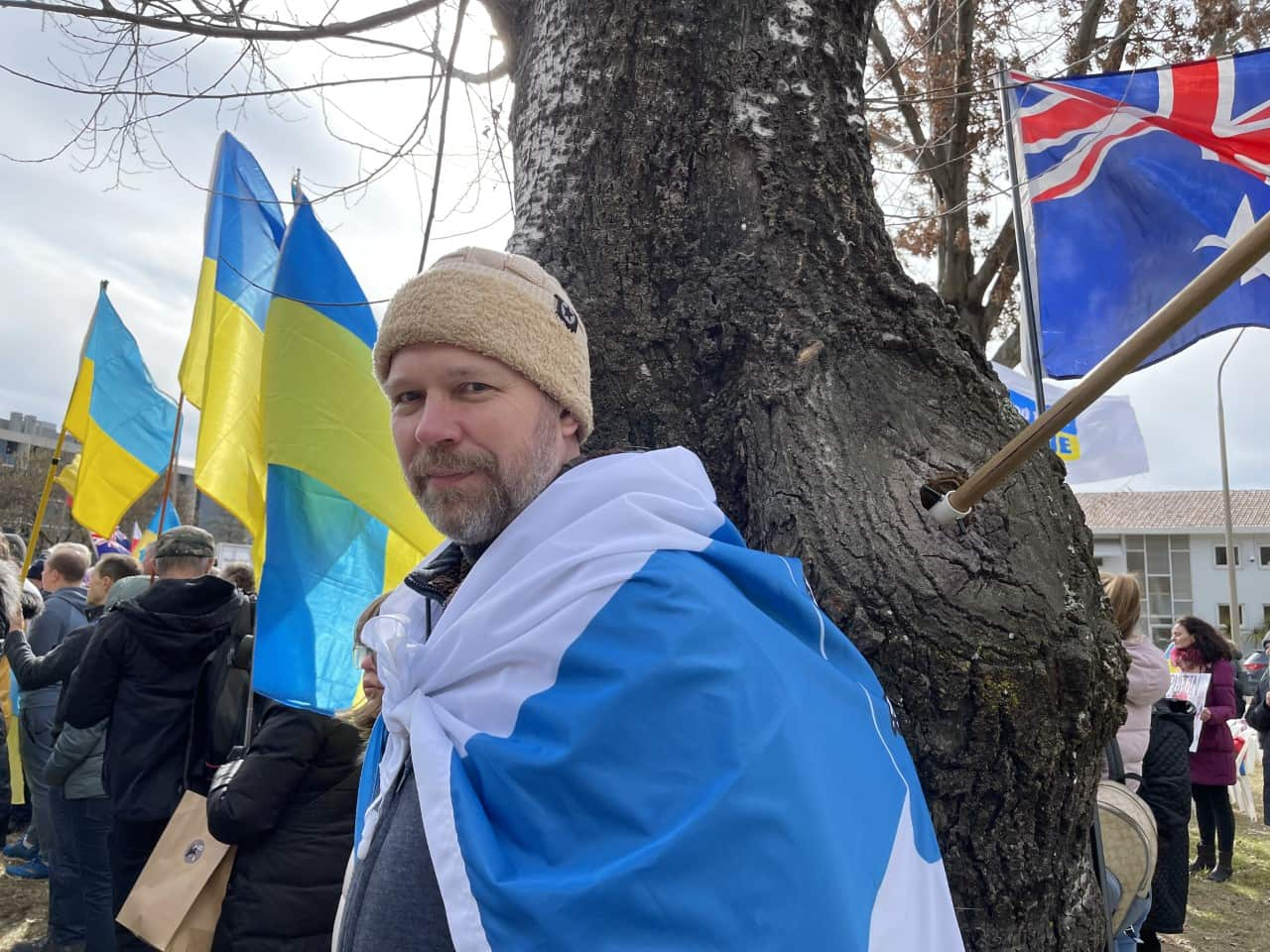The traditional folk festival of Maslenitsa sparked debate within the Russian community in Australia, already divided over the war in Ukraine.
Members of the diaspora had called for the cancellation of this year’s festival held in Burwood in Sydney's inner west on February 27, just two days after the one-year anniversary of the Russian invasion of Ukraine.
Anti-war rallies took place on February 24 in Sydney and February 25 in Melbourne and Adelaide.
However, the organisers and participants of the February 27 staging in Sydney – one of several Maslenitsa events organised by various Russian community groups – expressed that it is an important tradition to mark and that culture shouldn’t be mixed with politics.
Maslenitsa, also known as Masnytsia in Ukraine, is an Orthodox Christian holiday with roots in the Slavic pagan tradition of bidding farewell to winter.
The most characteristic food of Maslenitsa is the bliny - thin pancakes or crepes, made from butter, eggs and milk.
It is usually celebrated during the last week before the Great Lent and ends with Forgiveness Sunday. There are, however, some differences in how Russians and Ukrainians celebrate this holiday.
Events celebrating Maslenitsa in Sydney were cancelled last year due to the Russian invasion of Ukraine.
This year’s event has received funding from Multicultural NSW.

Marina Belkina, a member of the organising committee at the Russian Ethnic Community Society in Australia, said the goal of the Sydney event was to build harmony within the community.
Preparations, she said, began six months ago after a number of Russian language schools, dance and singing collectives requested it.
“We respect people who will attend rallies. But the festival isn’t taking place on the same day.
“Tradition is tradition, culture is culture, and they shouldn’t be mixed with politics.”
Ivan Pavlenko was among the opponents of the festival staging this year.
He is a member of the NSW chapter of Svoboda Alliance, an organisation started by Russians in Australia and New Zealand who oppose Russia’s war in Ukraine and President Vladimir Putin’s hardline regime.
“We are asking the organisers to cancel the event because we believe that any celebration is inappropriate and immoral in a time when tens of thousands of people die on both sides of the frontline,” Mr Pavlenko told SBS Russian before the event.
“I believe that culture is not only about holidays but also about compassion and feeling the moment when it is not a time for festivities.”

Dr Belkina believes all people are entitled to their opinion but “a political situation in one country shouldn’t affect people living in Australia".
“We live here, and our children grow up here. Our children don’t follow politics. Many were born in Australia and for them, the most important thing is love for their culture, for their homeland, and an opportunity to communicate with people who speak the same language and follow the same traditions.”
Sydney resident Nadia Okumusoglu told SBS Russian she joined an anti-war rally on February 24 and participated in the Maslenitsa festivities two days later.
As one of the volunteers helping to put on this year’s festival, she assured that the event is solely about celebrating the Russian culture and no political statements will be made.
“I would never participate in the event if I knew that it was being funded by the [Russian] consulate, or that there would be tricolours [Russian flags] or symbols that I find offensive,” she said.
Mrs Okumusoglu said she's attended a number of anti-war and Russian opposition rallies this year and has helped Ukrainian refugees settle in Australia.
At the same time, she said it is important to teach her two daughters about Russian culture.
Maslenitsa is a place where we recall our traditions, sing Russian songs, and talk in the Russian language.Nadia Okumusoglu
"We all know how difficult it is to keep it up in our children who were born or are growing up in a different country.”
As people mark one year since the full-scale invasion, Russia is believed to be launching a new major offensive in eastern Ukraine.
In his speech to the federal assembly on February 21, President Putin accused the West of waging war and said Russia was fighting for its existence.
In a statement from February 22, the United Nations Office for Human Rights called for Russia to stop targeted cultural destruction in Ukraine.
Hundreds of cultural sites across Ukraine, from museums to libraries and schools, have been destroyed or damaged in the military attacks.
“This is particularly true in occupied parts of Ukraine, including Crimea and eastern Ukraine, where efforts are being made to erase local culture, history, and language in cultural and educational institutions and to forcibly replace them with Russian language and with Russian and Soviet history and culture,” the statement read.
The debate about the folk festival has highlighted the divisions within the Russian community of Australia over the war in Ukraine.
Since the start of the full-scale invasion, many have openly condemned it.
Others have not taken sides: either refraining from expressing any views about the war at all or declaring they are pro-peace but not placing the blame for the aggression on Russia and President Putin.
Mr Pavlenko believes that "burying one’s head in the sand" is wrong.
He’s called on the diaspora in Australia to take to the streets to show that "we care, that we share the responsibility placed upon us by the Putin regime, the responsibility we didn’t ask for nor voted for but nevertheless share".
We want to show the entire world and ourselves that we are many and that Russians don’t want the war.Ivan Pavlenko
He said he feels "grief, pain, and shame" on the anniversary of the invasion of Ukraine.
“To be honest, here in Australia nobody has ever said either in my face or behind my back that Russians are bad. But I do feel national shame.
Mrs Okumusoglu believes: “Today we can’t demand loud statements from anyone."
“Some care about their family members who stayed in Russia; others care for their own mental health. There are people who care about their safety because they have sick relatives back in Russia, and they need to visit them," she said.
"I don’t believe that everyone has to walk with flags and endlessly make statements about their [political] position. People can have different reasons for not doing that.”
The row about the festival reached the Ukrainian community in Australia, many of whom, disapprove of its staging.
Daria Poliniaeva, who has been living in Australia for 35 years, said she was surprised to see a post promoting the festival on the 'Ukrainians in Sydney' group on Facebook.
“In a time when people are dying, when the entire world is helping, why not have fun when Ukrainian are being killed, especially on the anniversary of the war, in such a difficult time?"
